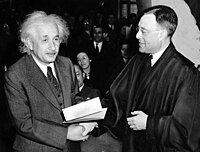United States nationality law

Okay kiddo, have you ever heard of nationality? It's a big word that means where someone is from or which country they belong to. And in the United States, there are rules and laws that decide who can become a citizen and who can't.
First, there are two ways to become a United States citizen – by birth or naturalization. If you were born in the United States, you automatically become a citizen. But if you were born outside the United States, you may still be able to become a citizen if one or both of your parents are U.S. citizens.
Now let's talk about naturalization. This is the process of becoming a citizen if you weren't born in the United States or if your parents weren't citizens when you were born. To become a citizen through naturalization, you need to meet certain requirements. These include being at least 18 years old, being a legal permanent resident for at least five years (or three years if you are married to a U.S. citizen), and passing a test on U.S. history and government.
But not everyone can become a citizen. There are some things that can prevent someone from becoming a citizen, such as a criminal record or being a threat to national security.
There are also different types of visas that allow people to come to the United States for different reasons, like work or studying. And some visas have special requirements or limitations.
So, in summary – United States nationality law is about the rules and laws that decide who can become a U.S. citizen and how someone can become a citizen. There are different ways to become a citizen, like by birth or naturalization, but not everyone can become a citizen. And there are also different types of visas that allow people to come to the United States for different reasons.
First, there are two ways to become a United States citizen – by birth or naturalization. If you were born in the United States, you automatically become a citizen. But if you were born outside the United States, you may still be able to become a citizen if one or both of your parents are U.S. citizens.
Now let's talk about naturalization. This is the process of becoming a citizen if you weren't born in the United States or if your parents weren't citizens when you were born. To become a citizen through naturalization, you need to meet certain requirements. These include being at least 18 years old, being a legal permanent resident for at least five years (or three years if you are married to a U.S. citizen), and passing a test on U.S. history and government.
But not everyone can become a citizen. There are some things that can prevent someone from becoming a citizen, such as a criminal record or being a threat to national security.
There are also different types of visas that allow people to come to the United States for different reasons, like work or studying. And some visas have special requirements or limitations.
So, in summary – United States nationality law is about the rules and laws that decide who can become a U.S. citizen and how someone can become a citizen. There are different ways to become a citizen, like by birth or naturalization, but not everyone can become a citizen. And there are also different types of visas that allow people to come to the United States for different reasons.
Related topics others have asked about:
